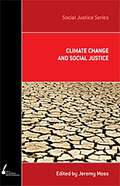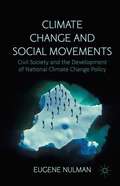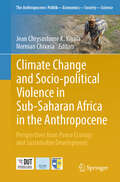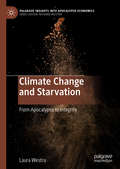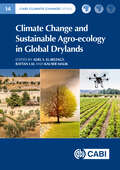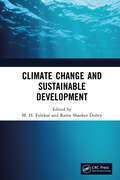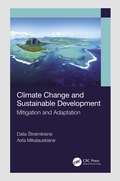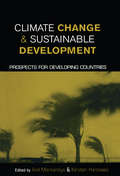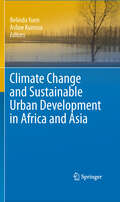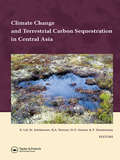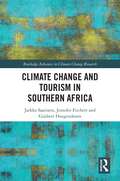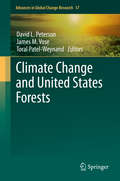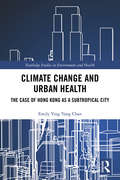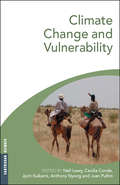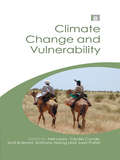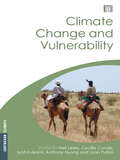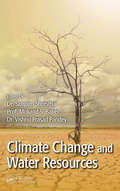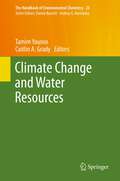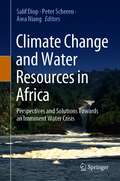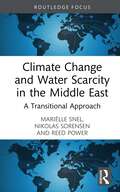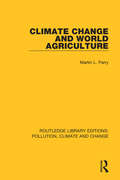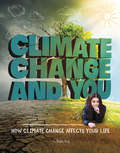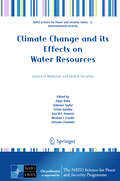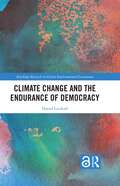- Table View
- List View
Climate Change and Social Justice
by Jeremy MossThe impacts of climate change can already be felt in society and on the Earth itself. As new evidence of the environmental impact of climate change is constantly emerging, we are forced to confront the significance of our political decisions about who will pay the price of responding to a changing climate. In the rush to avoid or reduce the repercussions of climate change, we need to ensure that the burden is evenly distributed or run the risk of creating injustice. Climate Change and Social Justice demonstrates that the problem of how to distribute the costs of climate change is fundamentally a problem of justice. If we ignore the concerns addressed this book, the additional burdens of climate change will fall on the poor and vulnerable. Jeremy Moss brings together today's key thinkers in climate research, including Peter Singer, Ross Garnaut and David Karoly, to respond to these important issues.
Climate Change and Social Movements: Civil Society and the Development of National Climate Change Policy
by Eugene NulmanClimate Change and Social Movements is a riveting and thorough exploration of three important campaigns to influence climate change policy in the United Kingdom. The author delves deep into the campaigns and illuminates the way policymakers think about and respond to social movements.
Climate Change and Socio-political Violence in Sub-Saharan Africa in the Anthropocene: Perspectives from Peace Ecology and Sustainable Development (The Anthropocene: Politik—Economics—Society—Science #37)
by Jean Chrysostome K. Kiyala Norman ChivasaThis book explores the theoretical contribution of peace ecology to the understanding and practice of environmental and conventional peacebuilding. It integrates environmental questions and factors that drive socio-political violence and climate change-induced violence in Sub-Saharan Africa in the Anthropocene.· It demonstrates how international peace and global security are no longer solely grounded in conventional peacebuilding that has evolved from liberal to democratic peace theories, but rather in the complex, critical and synergic relations between peace studies and environmental studies.· It provides a pluridisciplinary body of knowledge that emphasises the need for food security, social climate, social good, social capital and sustainable development at the age of climate change and climate wars.· It underscores the potential of peace ecology to reduce the Earth systems' vulnerability, to mitigate anthropogenic global warming's consequences on humanity, the ecosystem and biodiversity.· It yields various models of peacebuilding, conflict-sensitive and climate-sensitive adaptation strategies to enhance the African Region’s security and stability.Finally, this volume argues that planetary boundaries framework remains the safer space within which human and sustainable development can be pursued and attained, and future generations to thrive. A comprehensive and international response to socio-political violence and climate-change induced violence should take into account the vulnerability of individual countries, regions and the global world in order to achieve the dreams of a better future; that makes this book a cutting-edge scholarly work.
Climate Change and Starvation: From Apocalypse to Integrity (Palgrave Insights into Apocalypse Economics)
by Laura WestraThere is a lot written on climate change from various points of view, but this is the first work that demonstrates the connection between the hunger of the poor, the deprivation of safe and healthy food on the part of those who can afford it in the wealthy countries, but still face starvation in the sense of lack of nourishment, and climate change itself. It looks at the case law and the jurisdiction of the ICC, and adopts a thorough critical approach. This book is an excellent contribution to the development of the debate on climate change.
Climate Change and Sustainable Agro-ecology in Global Drylands (CABI Climate Change Series #22)
by Rattan Lal Adel S. El-Beltagy Kauser MalikDrylands, a home for nearly 2.5 billion people, are highly vulnerable to anthropogenic climate change, and dryland area may expand to 50% of the Earth's surface by 2100. Climate change may aggravate the prevalence of undernutrition and malnutrition because of adverse effects on quantity and quality of food production in these regions. This book takes a holistic approach to sustainable management of drylands to make agriculture drought-resilient. Eminent scientists from around the world share their knowledge and experiences for adaptation and mitigation of the anthropogenic climate change through innovation in sustainable management of water, soil, crops, livestock, and fisheries. They anticipate that climate change will have major impacts on agro- ecosystems which requires continuous dynamic assessments, globally, regionally, and at the local level where the major action of adaptation would have to occur. The assessment will require international cooperation and national capacity-building. This book emphasizes approaches such as smart and precision agriculture, conservation agriculture, and new innovation and technology as tools for adaptation and mitigation. Several chapters are devoted to the human dimensions and policy considerations with emphasis on enhancing coping and adaptive capacity. This book addresses the picture after COP27, including loss and damage, governance and finance. This book: Examines sustainable management for drylands as a solution to environmental and food security issues. Uses a holistic approach to evaluate sustainable management of drylands. Explains how researchers are translating science into action for greening global drylands. This work will be valuable to students and researchers in agroecology, climate change science and dryland agriculture.
Climate Change and Sustainable Development
by M. H. Fulekar Rama Shanker DubeyClimate Change and Sustainable Development covers the climatic and atmospheric changes, greenhouse gases and their impact on eco-system, biodiversity, water resources, agriculture and food security, human health, extreme weather and environment across two sections. The mitigation and adaptation strategies involving sustainable development is also illustrated including efficient technology, renewable energy, developmental activities control and so forth. Nanotechnology for sustainable development, forest protection, environment, social and economic sustainability and climate change policy planning of international bodies like UNFCC, UNDP, Kyoto protocol is also included. Features: Covers climate change fundamentals and its impact on different ecosystems and natural disasters Describes non-renewable energy aspects like fossil fuel, coal, oil, natural gas and so forth Explores sustainable development in terms of environment, social and economic aspects Includes species diversity and loss, agriculture productivity, water resources scarcity, health and environmental, rise in sea level and coastal area submergence Illustrates scientific hybridization of traditional ecological knowledge for enhancing climate change adaptation This book is aimed at graduate students and researchers in engineering and public policy, engineering management, sustainable engineering, renewable energy engineering, environmental engineering, and sustainability.
Climate Change and Sustainable Development: Mitigation and Adaptation
by Asta Mikalauskiene Dalia ŠtreimikienėClimate Change and Sustainable Development: Mitigation and Adaptation focuses on the link between climate change threats and sustainable development goals. This book analyzes the polices of climate change mitigation and adaptation from an economic point of view by addressing globalization, international trade, and business opportunities and challenges. Based on extended research on energy, transportation, agriculture, and more, the case studies included in this book present business opportunities linked to mitigation and adaptation actions; from European Union greenhouse gas emission trading to climate change adaptation policies in developing countries. It presents a framework for the harmonization of climate and sustainable development policies and their mutual outcomes. Specific features: The first book to address main scientific aspects of climate change mitigation and sustainable development and how to deal with these main challenges in a harmonized way Provides practical examples of policies and business development opportunities linked with climate change mitigation and adaptation Analyses climate change challenges and provides implications for business development and good practice case studies from Europe Discusses issues of climate change at different scales ranging from macro to micro level Highlights the importance of climate change adaptation for developing countries, migration trends, city developments and agriculture As the threat of climate change grows ever more present, resources like this book, that provide and discuss necessary solutions and frameworks for ways to deal with and mitigate that threat become ever more essential. This book is a vital resource for academics, students, and professionals in any field seeking to deal with the threats from climate change, and particularly those relating to environmental and climate sciences, as well as those in political and economic fields.
Climate Change and Sustainable Development: Prospects for Developing Countries
by Anil Markandya Kirsten Halsnaes'Makes a substantial contribution to the practical, effective analysis of climate change mitigation options in developing countries.'Development And Cooperation'The book is an excellent exercise and a good source of detailed information, and a basis for further discussions. Any person interested in this major environmental problem should read it.'International Journal of Environment and Pollution'Markandya and Halsnaes' collection is thoughtfully put together and can be recommended to all the practitioners in the fields of climate change and sustainable development.'The Journal of Energy LiteratureThis text argues that the policies pursued by developing countries will be crucial in determining the progress of climate change. Many are industrializing rapidly and the largest, particularly China and India, could have an impact at least as significant as that of the already industrialized economies - the reason given by President Bush for taking the US out of the Kyoto Protocol. The future of sustainable development in large measure depends on developing countries. This book develops a pragmatic framework for evaluating the climate change options faced by each developing country, depending on their individual circumstances. It assesses present methods, suggests how these might be improved, and proposes ways in which social and developmental aspects can be taken into account. Its discussion of the issues and the methods presented contribute to the practical analysis of climate change mitigation options in developing countries. The book should be useful to professionals, governments, international organizations and environmental groups working on climate change issues; as well as researchers, academics and students in economics, environmental and development studies and international affairs.
Climate Change and Sustainable Urban Development in Africa and Asia
by Belinda Yuen Asfaw KumssaThis book is about African and Asian cities. Illustrated through selected case cities, the book brings together a rich collection of papers by leading scholars and practitioners in Africa and Asia to offer empirical analysis and up-to-date discussions and assessments of the urban challenges and solutions for their cities. A number of key topics concerning housing, sustainable urban development and climate change in Africa and Asia are explored along with how policy interventions and partnerships deliver specific forms of urban development. It is intended for all who are interested in the state of the cities and urban development in Africa and Asia. Africa and Asia present, in many ways, useful lessons in dealing with the burgeoning urban population, and the problems surrounding this influx of people and climate change in the developing word.
Climate Change and Terrestrial Carbon Sequestration in Central Asia
by B. A. Stewart R. Lal M. Suleimenov D. O. Hansen P. DoraiswamyThis book brings together current knowledge of terrestrial C sequestration in Central Asia. The themes treated include: biophysical environments, water resources, sustainable agriculture, soil degradation, the effects of irrigation schemes on secondary salinization, soil management and its relationship to carbon dynamics; the relationship between f
Climate Change and Tourism in Southern Africa (Routledge Advances in Climate Change Research)
by Jarkko Saarinen Jennifer Fitchett Gijsbert HoogendoornThis book explores the nature of climate change in southern Africa, its impacts on tourism and the resilience, adaptation and governance needs in various tourism operations and environments. Previous studies on climate change and tourism have mainly focused on the Global North and specific forms of tourism such as snow-based winter activities. Drawing on case studies from a wide range of countries including South Africa, Lesotho, Namibia, Botswana and Zimbabwe, this book fills this lacuna by describing and analysing the climate change and tourism nexus in the southern African context. The book begins by providing an overview of the current and estimated impacts of climate change to the tourism industry in the region, highlighting the deepening socio-economic inequities, and environmental and social injustices. It focuses on the importance of sustainable tourism in tackling these issues and highlights that resilience and robust governance and policy systems are essential for a tourism destination to successfully adapt to change. By synthesising the key lessons learned through this analysis, Climate Change and Tourism in Southern Africa also draws attention to specific adaptation and policy strategies which have value for other regions in the Global South. This book will be of great interest to students and scholars of climate change, tourism and environmental policy and justice.
Climate Change and United States Forests (Advances in Global Change Research #57)
by Toral Patel-Weynand David L. Peterson James M. VoseThis volume offers a scientific assessment of the effects of climatic variability and change on forest resources in the United States. Derived from a report that provides technical input to the 2013 U. S. Global Change Research Program National Climate Assessment, the book serves as a framework for managing U. S. forest resources in the context of climate change. The authors focus on topics having the greatest potential to alter the structure and function of forest ecosystems, and therefore ecosystem services, by the end of the 21st century. Part I provides an environmental context for assessing the effects of climate change on forest resources, summarizing changes in environmental stressors, followed by state-of-science projections for future climatic conditions relevant to forest ecosystems. Part II offers a wide-ranging assessment of vulnerability of forest ecosystems and ecosystem services to climate change. The authors anticipate that altered disturbance regimes and stressors will have the biggest effects on forest ecosystems, causing long-term changes in forest conditions. Part III outlines responses to climate change, summarizing current status and trends in forest carbon, effects of carbon management, and carbon mitigation strategies. Adaptation strategies and a proposed framework for risk assessment, including case studies, provide a structured approach for projecting and responding to future changes in resource conditions and ecosystem services. Part IV describes how sustainable forest management, which guides activities on most public and private lands in the United States, can provide an overarching structure for mitigating and adapting to climate change.
Climate Change and Urban Health: The Case of Hong Kong as a Subtropical City (Routledge Studies in Environment and Health)
by Emily Ying ChanThis book provides a theoretical framework and related technical skills for investigating climate change and its public health consequences and responses with a focus on urban settings, and in particular Hong Kong, a subtropical metropolis in Asia. Specifically, the book examines the impact of climate change on health in terms of mortality, hospital admissions and help-seeking, as well as key response strategies of adaptation and mitigation. Many existing books tend to consider the relationship of climate change and public health as two connected issues divided into various discrete topics. Conversely, this book explicitly applies public health concepts to study the human impact of climate change, for example, by conceptualising climate change impact and its alleviation, mitigation and adaptation in a public health framework. Overall, this volume summarises what is known about climate change and health and ignites further debates in the area, especially for urban subtropical communities from within a wider global perspective. This book will be of great interest to students and scholars of environmental health, public health, climate change, urban studies and Asian studies.
Climate Change and Vulnerability (Earthscan Climate Ser.)
by Cecilia Conde Jyoti Kulkarni Neil Leary Anthony Nyong Juan Pulhin�Sound and solid case studies on vulnerability and adaptation have been woefully lacking in the international discourse on climate change. This set of books begins to bridge the gap.� Achim Steiner, UN Under-Secretary General and Executive Director of United Nations Environment Programme �Important reading for students and practitioners alike.� Martin Parry, Co-Chair, Working Group II (Impacts, Adaptation and Vulnerability), Intergovernmental Panel on Climate Change (IPCC) �This book fills an important gap in our understanding ... It is policy-relevant and deserves to be widely read.� Richard Klein, Senior Research Fellow, Stockholm Environment Institute (SEI), Sweden The award of the Nobel Peace Prize for 2007 to the IPCC brings needed attention to the threats from climate change for highly vulnerable regions of the developing world. This authoritative volume (along with its companion covering adaptation) resulting from the work of the Assessments of Impacts and Adaptations to Climate Change (AIACC) project launched with the IPCC in 2002, is the first to provide an in-depth investigation of the stakes in developing countries. It discusses who is vulnerable and the nature and causes of their vulnerability for parts of the world that have been poorly researched till now. It also provides researchers with new examples of applications of vulnerability assessment methods, an approach that is of growing interest in the climate change area but for which there are relatively few applications in the literature. Published with TWAS and START
Climate Change and Vulnerability and Adaptation: Two Volume Set (Earthscan Climate Ser.)
by Cecilia Conde Jyoti Kulkarni Neil Leary Anthony Nyong Juan Pulhin'Sound and solid case studies on vulnerability and adaptation have been woefully lacking in the international discourse on climate change. This set of books begins to bridge the gap.' Achim Steiner, UN Under-Secretary General and Executive Director of United Nations Environment Programme 'Important reading for students and practitioners alike.' Martin Parry, Co-Chair, Working Group II (Impacts, Adaptation and Vulnerability), Intergovernmental Panel on Climate Change (IPCC) 'Fills an important gap in our understanding ... It is policy-relevant and deserves to be widely read.' Richard Klein, Senior Research Fellow, Stockholm Environment Institute (SEI), Sweden The Intergovernmental Panel on Climate Change (IPCC) concluded in its 2001 report that much of the developing world is highly vulnerable to adverse impacts from climate change. But the IPCC also concluded that the vulnerabilities of developing countries are too little studied and too poorly understood to enable determination of adaptation strategies that would be effective at reducing risks. These authoritative volumes, resulting from the work of the Assessments of Impacts and Adaptations to Climate Change (AIACC) project launched by the IPCC in 2002, are the first to provide a comprehensive investigation of the issues at stake. Climate Change and Vulnerability discusses who is vulnerable to climate change, the nature of their vulnerability and the causes of their vulnerability for parts of the world that have been poorly researched until now. Climate Change and Adaptation covers current practices for managing climate risks to food security, water resources, livelihoods, human health and infrastructure, needs for effective management of climate risks, the changing nature of the risks, strategies for adaptation, and the need to integrate these strategies into development planning and resource management.
Climate Change and Vulnerability and Adaptation: Two Volume Set (Earthscan Climate Ser.)
by Neil Leary'Sound and solid case studies on vulnerability and adaptation have been woefully lacking in the international discourse on climate change. This set of books begins to bridge the gap.' Achim Steiner, UN Under-Secretary General and Executive Director of United Nations Environment Programme 'Important reading for students and practitioners alike.' Martin Parry, Co-Chair, Working Group II (Impacts, Adaptation and Vulnerability), Intergovernmental Panel on Climate Change (IPCC) 'Fills an important gap in our understanding ... It is policy-relevant and deserves to be widely read.' Richard Klein, Senior Research Fellow, Stockholm Environment Institute (SEI), Sweden The Intergovernmental Panel on Climate Change (IPCC) concluded in its 2001 report that much of the developing world is highly vulnerable to adverse impacts from climate change. But the IPCC also concluded that the vulnerabilities of developing countries are too little studied and too poorly understood to enable determination of adaptation strategies that would be effective at reducing risks. These authoritative volumes, resulting from the work of the Assessments of Impacts and Adaptations to Climate Change (AIACC) project launched by the IPCC in 2002, are the first to provide a comprehensive investigation of the issues at stake. Climate Change and Vulnerability discusses who is vulnerable to climate change, the nature of their vulnerability and the causes of their vulnerability for parts of the world that have been poorly researched until now. Climate Change and Adaptation covers current practices for managing climate risks to food security, water resources, livelihoods, human health and infrastructure, needs for effective management of climate risks, the changing nature of the risks, strategies for adaptation, and the need to integrate these strategies into development planning and resource management.
Climate Change and Water Resources
by Sangam Shrestha Vishnu Prasad Pandey Mukand S. BabelCovering the various aspects of water and climate change, Climate Change and Water Resources presents the principles of climate change science and its effects on earth's water supply. Utilizing the knowledge and expertise from well-known experts in the field, the text provides a broad outline of the many interrelated aspects of climate variations,
Climate Change and Water Resources (The Handbook of Environmental Chemistry #25)
by Tamim Younos Caitlin A. GradyThis volume presents nine chapters prepared by international authors and highlighting various aspects of climate change and water resources. Climate change models and scenarios, particularly those related to precipitation projection, are discussed and uncertainties and data deficiencies that affect the reliability of predictions are identified. The potential impacts of climate change on water resources (including quality) and on crop production are analyzed and adaptation strategies for crop production are offered. Furthermore, case studies of climate change mitigation strategies, such as the reduction of water use and conservation measures in urban environments, are included. This book will serve as a valuable reference work for researchers and students in water and environmental sciences, as well as for governmental agencies and policy makers.
Climate Change and Water Resources in Africa: Perspectives and Solutions Towards an Imminent Water Crisis
by Salif Diop Peter Scheren Awa NiangThe focus of this book is on the key water-related vulnerabilities to climate change in Africa, particularly in its most vulnerable areas, exploring potential management responses to such vulnerabilities. The African countries are particularly exposed and vulnerable to the negative impacts of climate change, with important impacts on water resources and hydrological systems, water availability, water resource management and sea level variations. Already, under various anthropogenic pressures, the status of water resources in Africa has been changing over the past decades, with decreasing water quality, falling groundwater levels, and variability in rainfall, both in terms of timing and intensity. Climate change will further accelerate the rate of change, affecting the ability of people and societies to respond in a timely manner. It is clear that there is no quick fix to the pressures imposed on water resources by climate change. Increasing the resilience of ecosystems and communities to extreme events such as flooding and drought, and integrating climate change risks and opportunities into development decision-making is indeed a key challenge, as much a technical climate-change one, as a political and developmental challenge. The book, in this regard, intends to contribute to the debate around climate change in relation to water resources management in Africa, and in particular inform policy decisions and actions that will improve governments’ and communities’ ability to manage the challenges of climate change and variability in relation to the aquatic ecosystems that they depend on. The knowledge collected in this book will benefit policy makers, researchers, as well as other stakeholders.
Climate Change and Water Scarcity in the Middle East: A Transitional Approach (Earthscan Studies in Water Resource Management)
by Mariëlle Snel Nikolas Sorensen Reed PowerAs water's significance as a geopolitical resource is poised to surpass that of oil, this book explores the adaptation of Water, Sanitation, and Hygiene (WASH) services in the Middle East to climate change challenges, leveraging the Humanitarian-Development-Peace nexus for a sustainable transition and resilient solutions. Delving into the humanitarian and development sectors across the region, the authors advocate for a transformative approach towards more innovative, integrated, and localized programming. It draws a parallel between the increasing global shift in humanitarian needs, as starkly revealed by the COVID-19 pandemic, and the ongoing devastation wrought by climate change, particularly through water-related crises such as flooding, drought, famine, and conflict. The authors stress the urgent need for adaptive and sustainable strategies that can swiftly respond to evolving climate challenges. This book argues that there is currently a window of opportunity for WASH practitioners to develop broader, multi-sectoral experiences to meet these challenges. Drawing on discussions with humanitarian and development practitioners and new contemporary case studies, this book analyzes the financial, institutional, environmental, technical, and socio-cultural considerations for creating sustainable WASH services in transition. The narrative emphasizes the urgent need for a Humanitarian-Development-Peace nexus approach, advocating for multisectoral collaboration and localization as vital to addressing protracted crises and climate change's escalating threats. It calls for a strategic shift towards organizations that merge immediate humanitarian aid with sustainable development, enhancing local capacities for effective, enduring solutions. The authors conclude by outlining practical actions for humanitarian and development organizations at the local, national, regional, and global levels to support effective integrated and transitional WASH programming in the future.
Climate Change and World Agriculture
by Martin L. ParryOriginally published in 1990, this book analysed the sensitivity of the world food system and looked at the variety of ways in which it would be affected by climate change. It describes the effects of climate change on agriculture, estimates the impacts on plant and animal growth and looks at the geographical limits to different types of farming. It also considers the range of possible ways to adapt agriculture and so to mitigate the disastrous consequences of climate change.
Climate Change and You: How Climate Change Affects Your Life (Weather and Climate)
by Emily RaijWhy should you care about climate change? Weather affects your everyday life and climate change can have major impacts. Discover how scientists study climate change, what current research shows, and what you can do to reverse its effects.
Climate Change and its Effects on Water Resources: Issues of National and Global Security (NATO Science for Peace and Security Series C: Environmental Security)
by Alper Baba Antonio Chambel Gökmen Tayfur Ken W.F. Howard Michael J. Friedel Orhan GündüzNational and global security can be assessed in many ways but one underlying factor for all humanity is access to reliable sources of water for drinking, sanitation, food production and manufacturing industry. In many parts of the world, population growth and an escalating demand for water already threaten the sustainable management of available water supplies. Global warming, climate change and rising sea level are expected to intensify the resource sustainability issue in many water-stressed regions of the world by reducing the annual supply of renewable fresh water and promoting the intrusion of saline water into aquifers along sea coasts, where 50% of the global population reside. Pro-active resource management decisions are required, but such efforts would be futile unless reliable predictions can be made about the impact of the changing global conditions on the water cycle and the quality and availability of critical water reserves. Addressing this wide spectrum of issues, a team of expert authors discusses here the impacts of climate change on the global water resources, the long-term resource management goals at global and local scales, the data requirements and the scientific and technical advances necessary to mitigate the associated impacts.
Climate Change and the Course of Global History
by John L. BrookeClimate Change and the Course of Global History presents the first global study by a historian to fully integrate the earth-system approach of the new climate science with the material history of humanity. Part I argues that geological, environmental, and climatic history explain the pattern and pace of biological and human evolution. Part II explores the environmental circumstances of the rise of agriculture and the state in the Early and Mid-Holocene, and presents an analysis of human health from the Paleolithic through the rise of the state, including the Neolithic Demographic Transition. Part III introduces the problem of economic growth and examines the human condition in the Late Holocene from the Bronze Age through the Black Death, assessing the relationships among human technologies, climatic change, and epidemic disease. Part IV explores the move to modernity, stressing the emerging role of human economic and energy systems as earth-system agents in the Anthropocene. Supported by climatic, demographic, and economic data with forty-nine figures and tables custom-made for this book, A Rough Journey provides a pathbreaking model for historians of the environment, the world, and science, among many others.
Climate Change and the Endurance of Democracy (Routledge Research in Global Environmental Governance)
by Daniel LindvallThis book explores the challenges climate change poses to the endurance of democracy, situating this theme within the context of the decline in global freedom documented since the early 21st century. It discusses how disaster events have historically affected human reasoning and agency and how the climate crisis is likely to influence democratic development in the future.Climate extreme events can provide opportunities for autocratic leaders to curtail rights and freedoms, but they can also create critical junctures where the social and political discourse within society is reshaped and where incumbent regimes are contested. The book illustrates how climate change may generate food insecurity, economic recessions and deepen socioeconomic inequalities. These effects may contribute to democratic backsliding but can also create new conditions for social mobilization. The democratic consequences of climate change are thus not primarily determined by the forces of nature, but by human responses and the social, economic and political conditions of the affected country. In the long-term perspective, however, climate change will have several negative effects on democratic stability. The book concludes that for human freedom and democracy to endure, modern society needs to be brought into balance with nature.This volume will be of great interest to students and scholars of climate governance, environmental politics, energy policy and global development.
